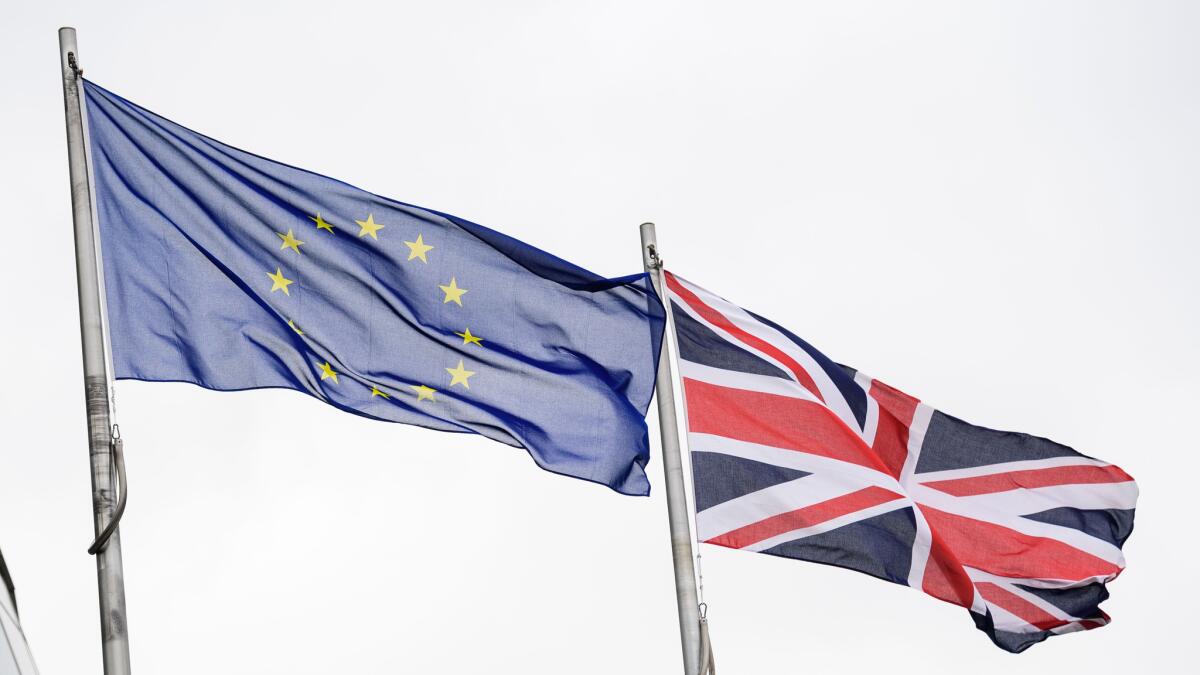Too close to call: Britain votes Thursday on whether to leave the European Union

- Share via
Reporting from London — During the last live debate before Britain’s vote Thursday on whether to leave the European Union, a frustrated Thomas Cridland repeatedly shook his head at his television.
Cridland listened as conservative former London Mayor Boris Johnson, who favors leaving the EU, spoke Wednesday night about being a passionate believer in immigration in one breath and the need to “take back control of our borders” in the next.
The statement felt personal to Cridland, a 25-year-old London resident who wants Britain to remain part of the 28-nation EU. His mother, who runs her own small accounting firm, is Portuguese, and his father is English.
“[My mother] is the perfect example of an EU national moving to England and making an invaluable contribution to their community and the country’s economy,” he said. “EU nationals are undervalued. A lot of people who have come from Europe have been here for 30 years and now even think in English.”
Analysts say the differences of opinion make the outcome of what has become known as the Brexit vote appear too close to call as Britain heads to the polls. The vote comes after a hard-fought, bitter campaign that has stirred up feelings of British pride and nationalism, and stoked fears about uncontrolled immigration if voters choose to remain in the EU and dire warnings of virtual economic collapse if they decide to leave.
The partnership of European countries began after World War II to generate economic cooperation and avoid war. The referendum is expected to have far-reaching consequences for British citizens, the rest of Europe and the world, especially if the “Leave” camp prevails.
If Britain votes to leave the EU, it would have to renegotiate its relationship with the remaining EU members and other countries, among other things. Leave supporters say that would place Britain in a better financial position, but “Remain” supporters, and leading economists, say that the benefits of being a EU member outweigh problems and that cutting the tie could negatively affect jobs, living standards and economic stability.
For many Britain citizens such as Johnson who want to leave the EU, the issue comes down to the nation’s ability to control its economy, laws and immigration policy without having to adhere to European Union rules.
Debates have been raging in pubs, offices and street corners. The vote results are expected to be announced early Friday.
Critland, who runs a fashion company and a public relations firm with his girlfriend, Deborah Marx, said he has been among those who have been thinking about the referendum all the time.
He talks passionately about “building bridges, not walls,” and advocates for the contribution EU migrants make to Britain. But he is also thinking about the financial effect leaving the union would have on his fledgling business.
“I got to the point where I was seriously worried what will happen,” he said. “I thought I needed to start showing a bit of passion … this is the most outspoken I’ve been politically.”
On Thursday, he plans to vote near his London home and use social media to encourage others to do the same. He will be conducting some interviews for European television channels, giving them the perspective of a young entrepreneur and will do anything he can to persuade people to vote Remain.
He’s not alone: Polls show the majority of entrepreneurs fear a break with the EU would hurt their businesses.
“They don’t know what will happen. There’s talk of a potential recession,” said Philip Salter, director of the think tank the Entrepreneurs Network.
He said small businesses that do not export any goods to Europe tend to be the exception to this rule as they welcome an end to what they see as burdensome EU regulations.
Cridland feels especially vulnerable as his suppliers are in Portugal, where he says he can buy higher quality fabrics, and he runs the distribution out of England, reaping all the benefits that being part of the EU’s free market provides.
London cabdriver Robert Mills, 60, said he was among the undecided on the eve of the vote. He said his heart is telling him to stay, but his head is saying he should go.
Mills is not fond of EU officials making laws that affect Britain.
Still, he worries about the country lurching to the right given that it’s the more right-wing elements of the Conservative Party and Nigel Farage’s UK Independence Party that are leading the Leave charge.
“I’ll probably decide when my pen hovers over the paper,” he said. “If we do leave and if we mess it up, at least we can’t blame anyone else for it. We’ll only have ourselves to blame.”
Boyle is a special correspondent.
ALSO
In Germany, fears that a British exit could be ‘the beginning of the end of the EU’
Potential for ‘Brexit’ adds to need for rate hike caution, Fed’s Janet Yellen says
Why the idea of ‘Brexit’ — Britain’s exit from the European Union — is shaking up markets worldwide
More to Read
Sign up for Essential California
The most important California stories and recommendations in your inbox every morning.
You may occasionally receive promotional content from the Los Angeles Times.












